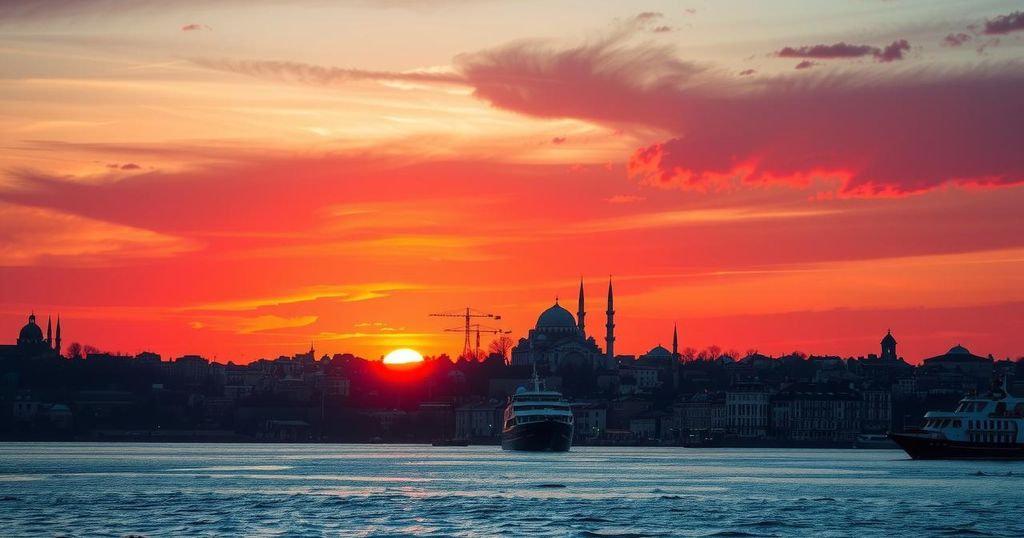Potential Russia-Ukraine Talks in Turkey: What You Need to Know

Peace talks between Russia and Ukraine could resume soon in Istanbul after President Putin’s proposal, while President Zelenskyy insists on a personal meeting. Previous negotiations in the same city fell apart, and both leaders have firm demands. The global community is watching closely, as military conditions intensify with both sides bracing for further conflict.
TALLINN, Estonia (AP) — As the conflict between Russia and Ukraine stretches into its third year, the focus is now on Istanbul, Turkey, where peace talks may soon unfold. Russian President Vladimir Putin proposed resuming direct dialogue with Ukraine, while President Volodymyr Zelenskyy invited him to meet face-to-face in the pivotal city that bridges Europe and Asia. Details regarding the participants in these talks remain uncertain, particularly whether Putin will attend.
After a high-profile meeting with European leaders in Kyiv over the weekend, Zelenskyy orchestrated a united front calling for a 30-day ceasefire that would commence on Monday. Support has surged from the European Union and even U.S. President Donald Trump, who suggested the need for fresh sanctions against Russia should Putin decline this offer. Despite this unified stance, Putin rejected the ceasefire proposition, suggesting the discussions be held without any preconditions.
In his fiery response, Zelenskyy emphasized that he expects Putin to be present, stating, “I will be waiting for Putin in (Turkey) on Thursday. Personally. I hope that this time the Russians will not look for excuses.” The situation raises questions about who from the Russian side might partake in the negotiations. Kremlin spokesman Dmitry Peskov has been tight-lipped on the matter, pointing out that Putin’s stance is clear enough.
Zelenskyy mentioned his plans to meet with Turkish President Recep Tayyip Erdogan should the discussions unfold in Türkiye, implying that he is prepared to wait for the Russian leader’s arrival. However, if Putin does not show, Zelenskyy indicated that incremental sanctions against Russia should follow, further complicating the diplomatic landscape.
Looking back nearly a year, the talks in Istanbul had previously collapsed due to stark differences in demands from both sides. Zelenskyy characterized the Russian position as an ultimatum, while Putin accused Ukraine of sabotaging potential agreements over issues like military neutrality and territorial concessions. The violence that erupted left both parties blaming each other for the breakdown, creating a chasm in negotiations that continues to widen.
Now, as the call for peace reverberates through the international arena, both sides hold steadfast to their demands. Putin insists that Ukraine must concede certain territories, like Crimea and four partially occupied regions, while Ukraine has remained resolute in not yielding land, instead seeking substantial security guarantees.
Reports indicate continued military preparations as each side braces for potential offensives this spring. The Institute for the Study of War highlighted Russia’s efforts to replenish troop levels while tightening its grip on strategic positions. On the battlefield, attrition has reportedly taken a heavy toll, claiming the lives of thousands as hostilities rage along the lengthy front lines.
Reaching a truce has proven elusive. Previous attempts at humanitarian ceasefires have failed, with accusations of violations from both sides undermining even limited agreements. The context of international diplomacy itself seems fragile as the world watches how the upcoming discussions may unfold in Turkey. The outcome remains uncertain, but the stakes are high as tensions escalate along a deeply fractured front.
In conclusion, the potential peace talks in Istanbul signify a crucial moment in the ongoing Russia-Ukraine conflict. With pressure on both leaders to find common ground amidst a backdrop of military escalation and international scrutiny, the world is left to ponder whether a path toward peace can be forged. Zelenskyy’s firm stance invites Putin to engage directly, but the reluctance from the Kremlin could complicate matters. As both sides hold on to their core demands, the outcome of these discussions remains uncertain, leaving room for further conflict or the hope for resolution.
Original Source: www.citizentribune.com






